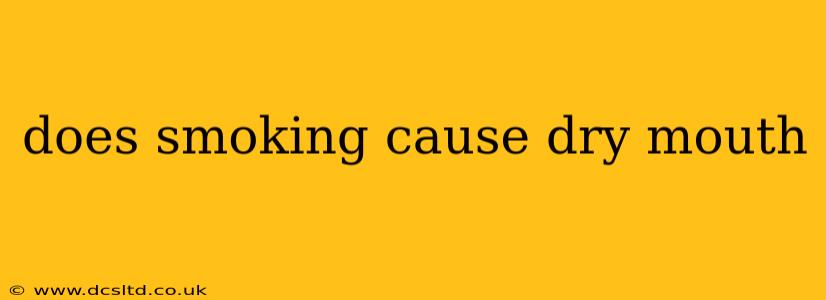Smoking is undeniably detrimental to your health, impacting numerous systems within the body. One often overlooked consequence is the development of chronic dry mouth, also known as xerostomia. This article will explore the link between smoking and dry mouth, examining the mechanisms involved and addressing common questions surrounding this issue.
How Does Smoking Contribute to Dry Mouth?
Smoking's impact on salivary gland function is multifaceted. The primary culprit is nicotine, the highly addictive substance in tobacco. Nicotine constricts blood vessels, reducing blood flow to the salivary glands. This decreased blood flow limits the glands' ability to produce saliva, resulting in a dry mouth sensation. Beyond nicotine, other chemicals in tobacco smoke further damage these crucial glands, leading to long-term impairment. The chronic inflammation caused by smoking can also affect the structure and function of the salivary glands, exacerbating the problem. Essentially, smoking creates a perfect storm that significantly reduces saliva production.
What are the Symptoms of Dry Mouth Caused by Smoking?
The symptoms of dry mouth are often noticeable and can vary in severity. Common complaints include a persistent feeling of dryness in the mouth, a sticky or thick feeling in the mouth, difficulty swallowing or speaking, a burning or tingling sensation on the tongue, and persistent bad breath (halitosis). These symptoms can worsen throughout the day, especially during periods of reduced fluid intake. For smokers, these symptoms often worsen with continued smoking and are often a persistent complaint even after quitting.
Can Quitting Smoking Help with Dry Mouth?
Yes, quitting smoking is crucial for alleviating dry mouth. While the damage to salivary glands may not fully reverse, quitting allows for improved blood flow and reduces the ongoing inflammatory process. Over time, saliva production can improve, leading to a reduction in the severity of dry mouth symptoms. However, it's important to manage expectations; the improvement may be gradual, and some degree of dryness might persist even after quitting. Supporting this process with increased hydration and other oral hygiene practices is essential.
How Long Does It Take for Dry Mouth to Improve After Quitting Smoking?
The timeframe for improvement varies from person to person. Some individuals experience noticeable relief within a few weeks of quitting, while others might see improvements over several months. The extent of the damage to the salivary glands, the length of smoking history, and overall health will influence the recovery time. Maintaining a healthy lifestyle and practicing diligent oral hygiene will accelerate the healing process.
Are There Other Causes of Dry Mouth Besides Smoking?
While smoking is a significant contributor, numerous other factors can cause dry mouth. These include:
- Medications: Many medications, particularly those used to treat anxiety, depression, and high blood pressure, list dry mouth as a potential side effect.
- Medical conditions: Certain diseases, such as diabetes, Sjögren's syndrome, and HIV/AIDS, can impact salivary gland function.
- Dehydration: Insufficient fluid intake is a common cause of temporary dry mouth.
- Mouth breathing: Breathing through the mouth instead of the nose can lead to excessive moisture loss from the oral cavity.
- Radiation therapy: Radiation treatment to the head and neck area can damage salivary glands.
How Can I Treat Dry Mouth Caused by Smoking?
Managing dry mouth involves several strategies:
- Increase fluid intake: Drink plenty of water throughout the day.
- Use sugar-free gum or candy: Stimulating saliva production can help alleviate dryness.
- Avoid alcohol and caffeine: These substances can further dehydrate the body.
- Maintain good oral hygiene: Brush and floss regularly to remove bacteria that thrive in a dry mouth environment. Consider using a fluoride mouthwash to protect against tooth decay, a common consequence of xerostomia.
- Saliva substitutes: These are artificial saliva products that can provide temporary relief. Consult your dentist for recommendations.
- Prescription medications: In some cases, your doctor might prescribe medications to stimulate saliva production.
Conclusion: Addressing Dry Mouth Caused by Smoking
Dry mouth is a significant and often underestimated consequence of smoking. The damaging effects of tobacco on salivary gland function are substantial and long-lasting, even after cessation. While quitting smoking is paramount in improving dry mouth symptoms, it's crucial to address this condition proactively with appropriate treatment and lifestyle changes. Consult your doctor or dentist if you experience persistent dry mouth, especially if associated with other symptoms. Addressing dry mouth effectively improves oral health, comfort, and overall quality of life.
